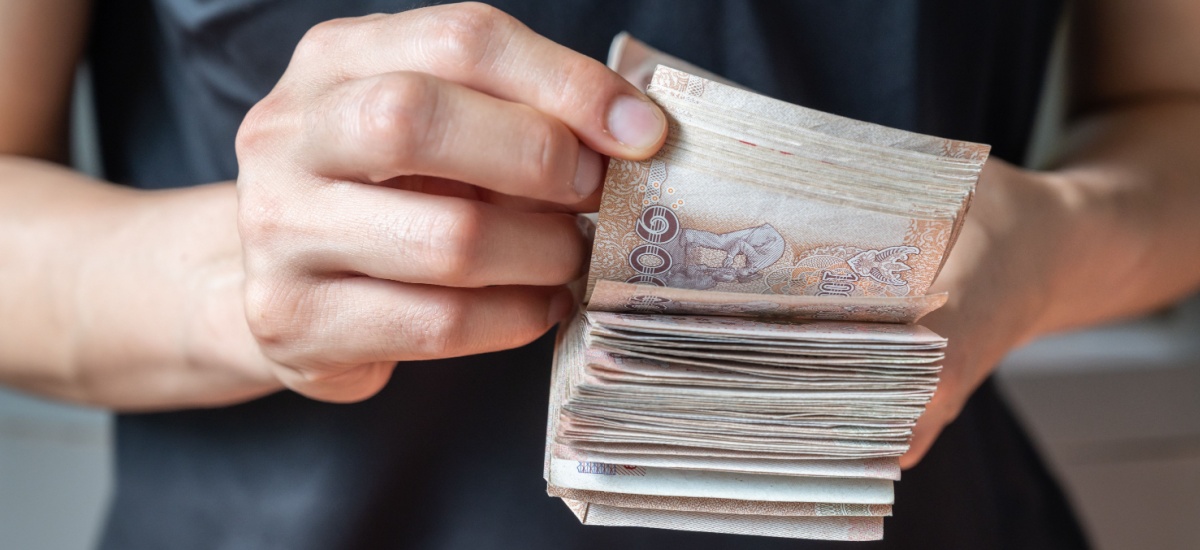Money in Thailand: Banks, ATMs, cards & currency exchange
Read our helpful guide to money, banks and currency in Thailand, plus info on cards, ATMs and currency exchange.

Travelling to Thailand and need to take cash with you? Perhaps you’re putting down a deposit on a holiday home or are taking all your spending money for a 3-month trip.
Whatever your plans, you’ll need to know about the rules for taking cash in and out of Thailand. Nearly every country has them, so that authorities can check the cash hasn’t come from criminal activity or been stolen.
Read on for a full guide to taking cash in and out of Thailand.
Plus, a quick look at a convenient cash-free alternative for spending abroad - the Wise card.
Learn more about the Wise card 💳
According to Thailand’s official rules, you can bring up to $20,000 USD or the currency equivalent into the country before you have to declare it to customs.1
If you’re bringing Thai baht (THB) into the country rather than a foreign currency, the most you can carry with you is 500,000 THB.1
The definition of cash can be fairly wide. For this purpose, the strict definition of what you must declare covers both cash and negotiable monetary instruments.
That means that as well as hard currency, anything that could easily be passed on or converted to cash, should be declared.
Ask at the border if you have any concerns - but here’s a basic round up of what usually counts as cash:
If you bring too much cash into the country and don't declare it, it’s a criminal offence.1 That can mean that your cash is seized if found, and you could be subject to criminal charges, fines and even prison in the most serious cases.

If you’ve never done it before, the idea of making a declaration at customs in a foreign country can be a little daunting. Read the following info so you’ll know what to expect.
The Thai customs website doesn’t make any mention of procedures to declare cash before you travel. So even if you know you’re likely to be carrying a declarable amount of cash and you want to be super organised (and save time at customs), you’ll need to wait until you arrive in Thailand to make your declaration.
Once you arrive at a Thai airport or port, follow the ‘goods to declare’ or ‘red channel’ signs.
A customs officer will examine your passport and baggage, and you’ll be able to declare your cash. There may be duties or taxes to pay, and you’ll be given a receipt.
Then, you simply need to gather your belongings and make your way to the exit.2
It’s a good idea to have the following information and documents ready to provide at customs:
The same rules apply for taking cash out of Thailand as for bringing it in. You can take up to $20,000 USD or the currency equivalent out of the country.1
If you’re carrying Thai baht, you can take up to 500,000 baht to any of Thailand’s bonded countries and up to 50,000 baht to any other destination.1
Take anything above that sum, and you’ll need to make a customs declaration.
It’s a criminal offence to bring too much cash into Thailand and not to declare it, or to make a false declaration to customs authorities. The penalties can be severe, including a potential fine of up to 500,000 baht (nearly £11,000 GBP). In some cases, it could result in a prison sentence.3
Thai customs doesn’t make any information available about destinations where a declaration for carrying cash isn’t needed. So, it’s best to play it safe and assume the rules will apply wherever you’re heading to after you leave Thailand.
According to Thai Customs, you need to declare cash over $10,000 or the currency equivalent when you enter and leave Thailand - for all onward destinations.

Travelling with large amounts of cash is a real security concern, so it’s best avoided unless absolutely necessary. Consider withdrawing cash at an ATM on arrival instead, or having the money sent by bank transfer.
The safest way to carry cash is on your person, so invest in a good quality money belt to wear under your clothes for the duration of the journey.
Carrying one big wad of cash isn’t very discreet, and it’s risky too - if it’s misplaced or stolen, that would be all your money gone. So consider splitting your money between a money belt worn on your person, between members of your travelling party, and between pieces of luggage too.
If you’re carrying money to pay for your trip and need to exchange it once you get to Thailand, you might struggle to find a good deal.
Many of the exchange bureaus and offices which are in the most convenient locations - the airport or your hotel, for example - offer poor exchange rates.
That means you have to choose between spending your precious holiday time searching for a better deal, or getting ripped off on the exchange.
Rather avoid the security concerns and inconvenience of carrying cash between countries? Check out the Wise card instead.
The Wise card is a truly international debit card, as it works in 150+ countries and has no foreign transaction fees. It automatically converts currency at the mid-market exchange rate whenever you spend, for just a small conversion fee*.
Or if you already have the currency in your Wise account, there’s no fee to pay.
You can also use Wise to send money worldwide for low fees and great exchange rates, even sending large sums conveniently and securely.
So whether you need travel money or to pay for goods, services or bills in other countries, Wise is the ideal solution.
Learn more about Wise products 👇
The following must be declared at Thailand customs:2
You can bring a maximum of $9999.99 USD or currency equivalent into Thailand before you’re required to make a customs declaration. The tipping point is $10,000, after which you need to declare it.
The cost of living in Thailand is quite cheap, especially compared to the UK. So you shouldn’t need a huge amount of cash for a holiday or even a longer stay. For safety, it could be best to take just a small sum to start with - and use an ATM once you arrive.
For certain Thai visas, it’s necessary to show proof of funds to support yourself during your stay, or to pay for travel back home. However, this doesn’t apply to most UK visitors to Thailand, as UK citizens can travel there for up to 30 days without needing a visa.4
Sources used for this article:
Sources checked on 17-04-2024.
*Please see terms of use and product availability for your region or visit Wise fees and pricing for the most up to date pricing and fee information.
This publication is provided for general information purposes and does not constitute legal, tax or other professional advice from Wise Payments Limited or its subsidiaries and its affiliates, and it is not intended as a substitute for obtaining advice from a financial advisor or any other professional.
We make no representations, warranties or guarantees, whether expressed or implied, that the content in the publication is accurate, complete or up to date.

Read our helpful guide to money, banks and currency in Thailand, plus info on cards, ATMs and currency exchange.

Learn how to claim your VAT refund in Thailand with our comprehensive guide, perfect for UK travellers. Discover the VAT refund process to maximise your savings

Want to stay connected while travelling in Thailand? We’ll help you find the best eSIM for your trip, including what to consider, how to activate and top tips.

Travelling to Thailand and need to take out cash? Learn about where to find ATMs, how much are the withdrawal charges, and some tips on how to save on ATM fees.

Read our essential guide on travel to Thailand from the UK, featuring must-know travel advice on money, safety, visas, transport and more.

Can I use my Barclaycard in Thailand? Find out here in this handy guide, including fees for using your credit card in Thailand.